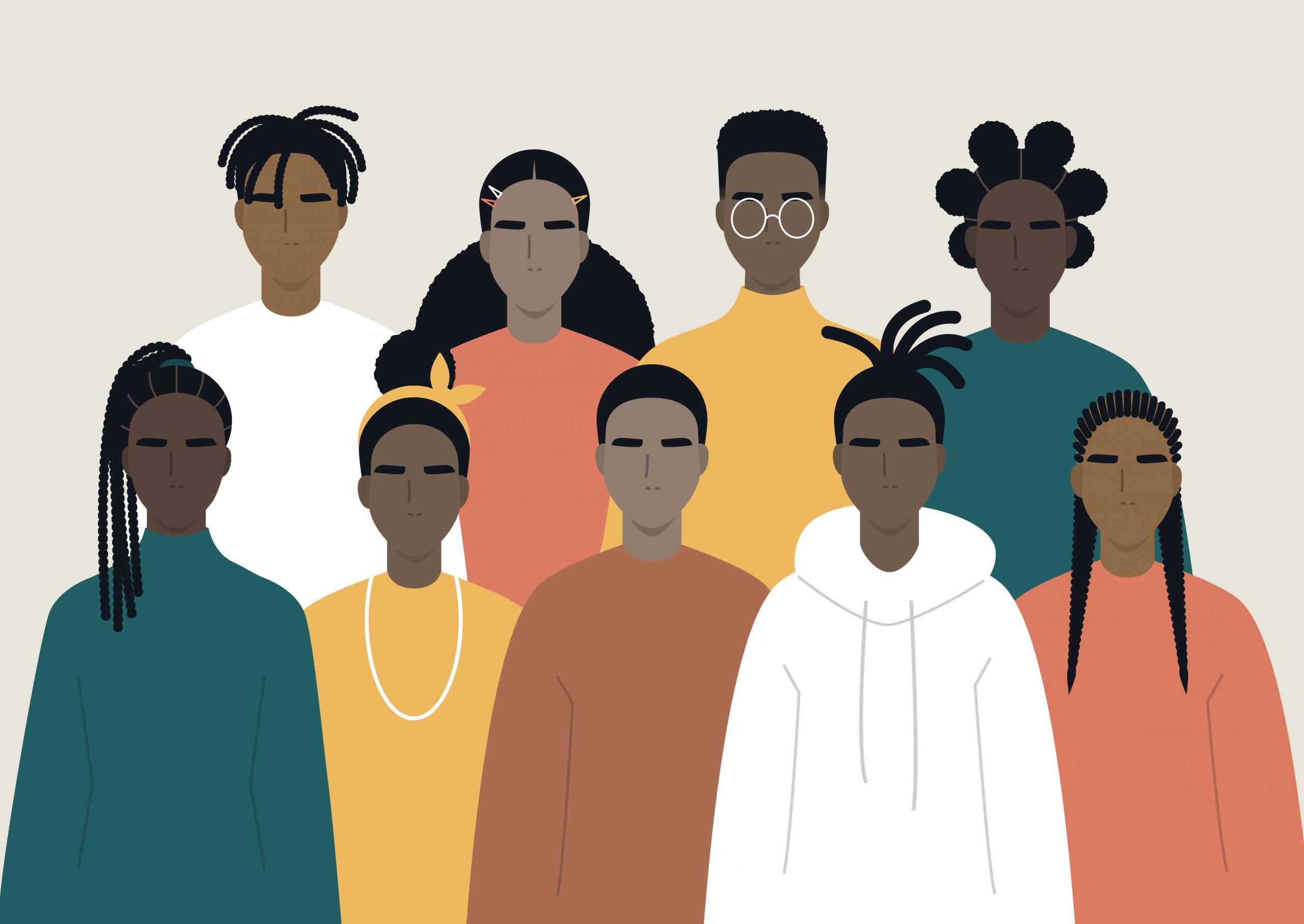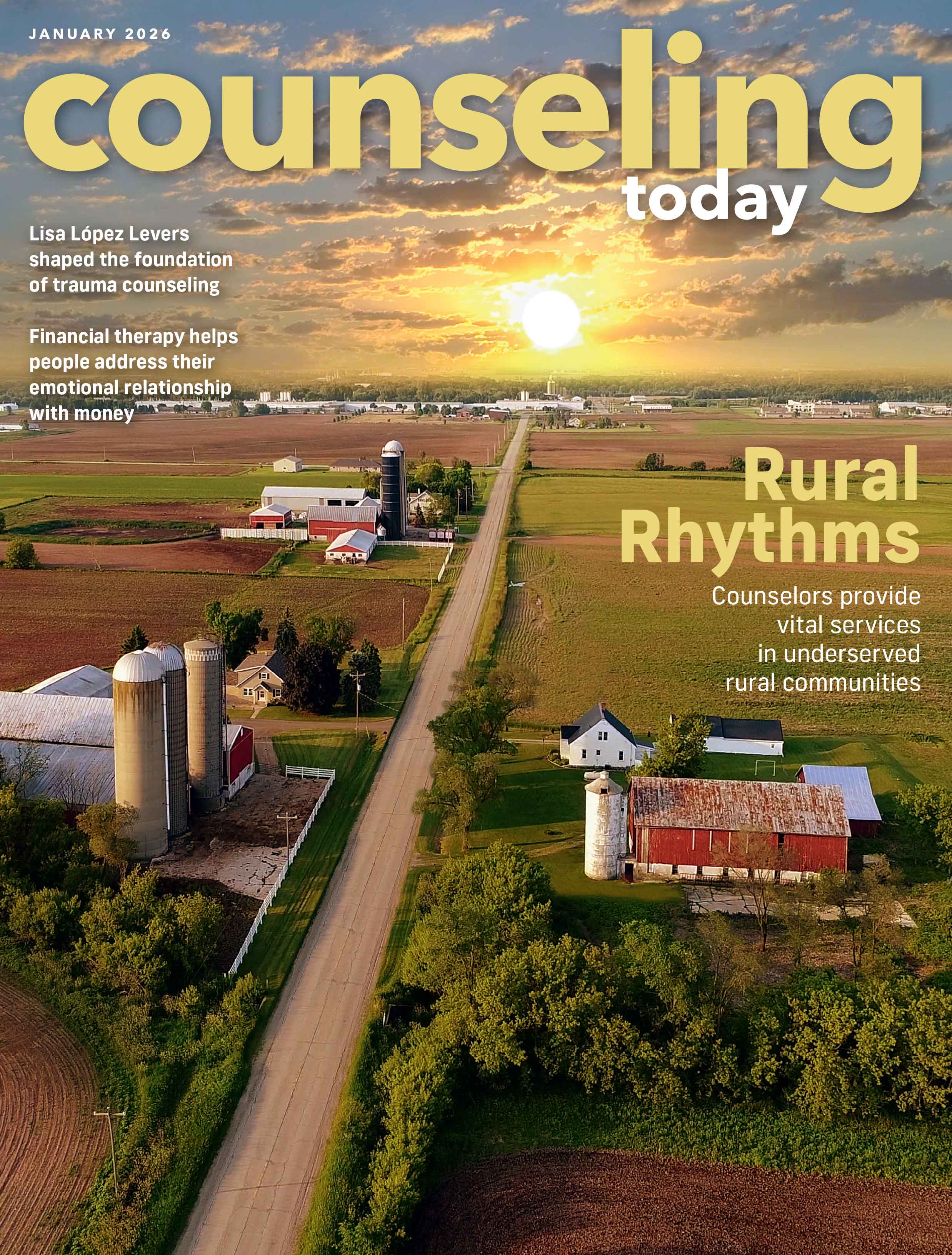Mental health care stigma in Black communities
By Samantha Cooper
February 2023

Recent studies by the Anxiety & Depression Association of North America have shown that Black people are 20% more likely to experience significant mental health problems than the rest of the population yet only about a quarter of them seek mental health care, compared to about 40% of white Americans.
Counseling Today asked three mental health professionals who are working to improve Black mental health about the mental health challenges and barriers many Black people face. Cheryl Maxwell is the program manager for the Black Mental Health Alliance located in Baltimore and a certified alcohol and drug counselor in Maryland. Malton Cook Jr. is a licensed professional counselor supervisor in Texas who specializes in person-centered and solution-focused approaches. And Jardin Dogan-Dixon is a licensed counseling psychologist with the federal government and owner of @blkfolxtherapy on Instagram.
////
Why is there a stigma against seeking mental health care in Black communities?
Cheryl Maxwell: Suspicion continues to be an issue due to negative experiences, past and present, that have impacted these communities.
Malton Cook: A lot of times, there are myths about mental health in terms of “crazy” people, so a lot of times people steer clear of counseling because of the negative stigma that’s associated with it. … I think part of it is we’re often taught to “suck it up” and be strong and not allow other people see us break. … These things are passed down from one generation to the next.
Jardin Dogan-Dixon: Some folks will say, ‘I don’t want to see a doctor and that includes a mental health doctor.’ There’s a lot of stigma we’re fighting against and a lot of mistrust we have to work through. [Black individuals] make up only about 2% of the entire population [of psychologists]. … So a lot of [Black clients] don’t see themselves in the providers they hope to work with. And we know that’s a deterrent because a lot of research suggests individuals sometimes need that familiarity; they need someone who can kind of do a referral process. A lot of Black individuals rely on word-of-mouth for health care services in the medical system, but if you don’t have individuals to see [who look like you] in the community, … then it’s really hard to bridge the mental health treatment gap.
What are the biggest mental health challenges facing Black communities?
CM: The lack of qualified Black, African American and persons of color who are certified or licensed mental health professionals.
MC: The access to or the lack of knowledge [about mental health resources]. The negatives stigmas that are still existing. Individuals may also think there’s a lack of representation within the mental health field.
JDD: As far as therapists and psychologists go, we don’t get necessarily trained a lot to work with Black individuals. The norms in our training programs are definitely whitewashed and that doesn’t leave a lot of room to focus on the cultural nuances that may show up in therapy. I work with Black clients and their [depression] symptoms may look different but that doesn't mean they’re not experiencing depression. It just shows up differently based on social norms, history and language barriers.
We’ll also say therapy is somewhat of a white people thing because it’s not a norm in our culture. We’ll say, “I don’t want to tell somebody my business.” [But] if family members and other people in your extended network are struggling and you’re also struggling, how are you going to help each other? For some folks, they have learned to follow a code of silence of “what happens in our house stays in our house” because we face so many unforgiving stereotypes and misconceptions in larger society about who we are and our different cultural norms. But how unfortunate would it be for you to miss out on your healing because you don’t want others to know that you’re struggling? The “strong Black woman” and the John Henryism tropes don't always benefit us when it comes to taking care of our mental health. We feel as though we have to do it alone because we can. But our hyper-independence can really harm us in the long term. We were meant to be interdependent.
How can people help reduce the stigma around mental health within Black communities?
MC: Educating yourself, doing your own research, doing a lot of reading and being willing to ask questions. Essentially going into [therapy] with an open mind and heart and being willing to actually listen and receive information.
JDD: When I speak with my clients, I talk about how they are the experts of themselves, and I’m here to help guide them. And sometimes this could look like them understanding their baseline, which is the day-to-day functioning or their “normal” per se, and when they deviate from that baseline. You have to hone self-awareness to recognize when you’re not able to manage your stress like you used to with old coping strategies, [when] your thoughts are more ruminative and self-defeating, and/or if you’re more sad, irritable, or lonely, and ultimately be willing to ask for help.
What can individuals in Black communities find out more about counseling and how to access the care they need?
CM: Through their primary care physician, church leadership, area colleges or universities.
MC: Just know that counseling is different for everyone, … so keep trying, keep looking, keep connecting until you find one [a counselor] who best fits you. It’s like dating at times.
Also, don’t approach counseling with the mindset that “I’m going to go in and they’re going to ‘fix me.’” I think people think that oftentimes we [as counselors] just wave a magic wand and everything will kind of be OK. I definitely would encourage patients in terms of working with a therapist that … it takes time to build trust.
People need to be open-minded and be OK with asking questions. … And do your own research.
JDD: I think if we are able to acknowledge that Black people experience stress and trauma at disproportionate levels compared to other racial and ethnic groups because of racism, oppression and most recently the COVID-19 pandemic, then it would also help Black folks feel like they’re not alone or “crazy” for seeking help. You may be going through a lot and therapists can validate that and help build coping skills to manage the stress and heal the trauma.
Give [therapy] three sessions: The first one is the hook; the second one gets you into the groove; and the third session you think, “Maybe I can do this.” … I tell folks to give it a chance; if [the counselor] doesn’t mesh, find another one. Don’t give up!
////
Here are some resources focused on Black mental health and bringing healing to Black communities:
- Black Mental Health Alliance and its database of Black mental health care providers
- Therapy for Black Girls
- Therapy for Black Men
- The Loveland Foundation (This foundation provides vouchers to cover the cost of counseling for Black individuals, particularly women and girls. Applicants must fill out a form and be approved to receive up to 12 vouchers for counseling sessions)
- African American Mental Health Providers
- Black Mental Health podcast
- Therapy for Black Girls podcast
- American Counseling Association’s resource page on BIPOC mental health and racial trauma and healing
- National Alliance on Mental Illness’s and the Mental Health America’s articles about Black and African American communities and mental health
- Follow Dogan-Dixon on Instagram @blkfolxtherapy
Related reading in Counseling Today:
- “Counseling individuals of African descent”
- “The historical roots of racial disparities in the mental health system”
- “Black mental health matters”
- “Encountering and addressing racism as a multiracial counselor”
- “Investigating the impact of barbershops on African American males’ mental health”
- “Counseling while Black”
- “African Americans and the reluctance to seek treatment”
- “Developing competence to address undue police violence”
- “Breaking the silence around the childhood sexual abuse of Black men”
Samantha Cooper is a staff writer for Counseling Today. Contact her at scooper@counseling.org.
The views expressed in Counseling Today are those of the authors and contributors and may not reflect the official policies or positions of the editors or the American Counseling Association.


